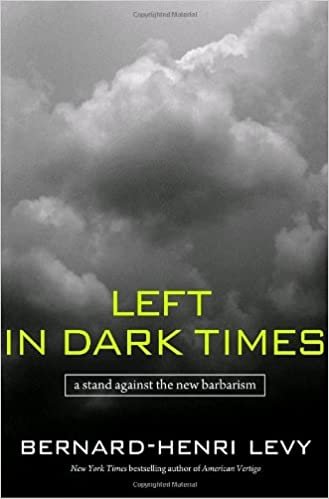The Long View: Left in Dark Times
Bernard-Henri Lévy, sometimes referred to simply as BHL, has had a remarkable life. While being known as a public intellectual, BHL has been a mover and shaker in politics in a way that most intellectuals can only dream. The most prominent example in my mind is when Lévy successfully got the United States to sign on to support Libyan rebels in 2011, against the resistance of BHO, our president at the time.

Left in Dark Times:
A Stand Against the New Barbarism
By Bernard-Henri Lévy
Original Title: Ce Grand Cadavre à la Renverse
Translated by Benjamin Moser
Random House, 2008
233 Pages, US$25.00
ISBN 978-1-4000-6435-9
It’s a mistake to name something “new.” The New School for Social Research; New Criticism; New City (Nea Polis = Naples): sometimes these things last a very long time and the name becomes an anachronism. Still, for better or worse, Bernard-Henri Lévy is classed among the “New Philosophers.” Those were the people who, in the 1970s, developed the anti-totalitarian wing of the French Left. This books reprises and clarifies many of the themes of Barbarism with a Human Face, the slim incendiary work from those years that made the author world famous. He has been doing a great deal since, both as a writer and as an international human-rights advocate of the fewer-dead-bodies-please variety. His most recent prior book was American Vertigo, one of a long tradition of French attempts to update de Tocqueville’s political-science reporting in the United States. America comes into this book, too, but rarely for criticism: he sees the European Left and American Liberalism as parts of the same system, with the difference that the American version is more humble and realistic. Actually, he thinks that the centrality of anti-Americanism to the most fashionable political trends in Europe is one of the keys to understanding the two-sided theme of this book: Why am I still a Leftist when the Counter Enlightenment is taking control of the Left?
For the most part, the author’s practical views on human rights and social policy increasingly converge with those of the French President, Nicolas Sarkozy. They have known each other for years; the author tells us they have been on many “journeys to the desert” together, from which we may infer that they have both endured periods of political eclipse, or that they have been together on fact-finding delegations to Africa and the Middle East: the text is surreally allusive in this as in other matters. Nonetheless, the book begins with a transcript of a conversation in which presidential candidate Sarkozy asks his old colleague for a little article of endorsement to appear in some respectable venue, but the author hems and haws without agreeing. A reader infected with the French disregard for Occam’s Razor might suspect that the author was in fact maintaining his usefulness to the Sarkozy government by publicly declaring his independence from it, but let us here confine ourselves to the text. The author tells us that he would always vote Left because of certain images, some from history (including the liberal Anglosphere revolutions and the early French Revolution) and some from his own experience. He means especially the “revolutions” that did not go sour; the largely peaceful transformations like the overthrow in the 1970s of the semi-fascist Salazar regime in Portugal, and for that matter, the Eastern European transformations of 1989. (Vaclav Havel, too, was a man of the Left in the sense that the author means it.) These images are not the culmination of the historical process, as in Marxist eschatology, or even earnests of a future, universal culmination. Rather, they are like carnivals, escapes from the tyranny of history and its oppressive logic.
The Left to which the author swears allegiance does have some conceptual content, specifically these four points (the reviewer's summary, not a quote):
It includes Dreyfusism, which might be taken to mean that justice is more important than raison d’état.
It includes the Spirit of 1968, which the author takes to have been a largely anti-totalitarian phenomenon, despite the pesky Maoists who were so conspicuous at the time. (We should note the author, the French editor, the translator, and the English editor all let stand the attribution to Mao Zedong, rather than to Zhou Enlai, of the assessment that it was too early to judge the French Revolution: there’s 21st century publishing for you.)
The Left in the author’s sense includes anticolonialism, which in this context seems to mean chiefly anti-racism.
The Left is also antifascist, a fuzzier term that the author associates with opposition to the blood-and-soil nationalism of Vichy and, as we will see, with rejection of the Counter Enlightenment.
As an example of this Left in action, we are given the author’s response to the violence in recent years in the banlieus, the largely Muslim suburbs of Paris. The author does not recommend bleeding-heart acquittal of the perpetrators because of the hardness of their lives. They were, some of them, bad people doing bad things. Still, the willingness to judge the moral quality of their acts provides no excuse from figuring out just what happened and why it happened just then. The author does not put it quite like this, but he seems to see the Left as moral realism with social curiosity.
Similarly, the school of the New Philosophers saw four idols of the Left as particularly in need of smashing:
One idol was the Platonic Social Ideal, which we may take to mean the image of an absolutely desirable society, perhaps located in the future, in comparison to which all existing societies are unsatisfactory and contemptible. Another was the dialectic, the kind of historical logic that makes revolutionary models of history unfalsifiable by turning any catastrophe into a promise of good things to come. The third thing to be rejected was the tendency to recast issues of right and wrong in terms of health, so that what might seem to an unschooled observer to be a program of atrocity would seem, to the revolutionary, to be “radical surgery.” The most important object of the New Philosophers’ ire, however, was History, especially history in the sense that whatever we do today can be excused by the wonderful effects our misdeeds will have on the other side of the revolution.
The whole of the serious Left, the author notes, has lost the revolutionary impulse. They no longer wish to break history in two parts, with a gleaming, wholly novel present and future separated by a period of sanguine cleansing from a despised past, a past the memory of which is systematically suppressed. They no longer wish to wipe the slate clean because, after the 1970s, they had some concrete examples of what that would mean.
Alexander Solzhenitsyn’s The Gulag Archipelago was part of the education of the Leftist academy on the reality of real, existing socialism. More important, though, was the brief, appalling example of revolutionary Cambodia. When other revolutions turned into garden-variety tyrannies or somewhat exotic police states, it could always be said that the revolutionaries had not gone far enough, they had relented in their war against the class enemy and did not dig deep enough to get at the roots of their society’s reactionary institutions. Well, the Khmer Rouge of Cambodia emptied the cities and declared everyone who wore glasses a reactionary intellectual. The revolution could not have been more radical, but it was clearly just an exercise in sustained mass murder. The French especially were aware that the Khmer leaders had studied at Paris. Thereafter, the French Left sought other amusements. Which brings us to the second issue.

Bernard-Henri Lévy at Tel Aviv University
By Itzike - Own work, CC BY-SA 3.0, https://commons.wikimedia.org/w/index.php?curid=15381612
The Left has overcome the totalitarian temptation, we are told, but it has developed an antiliberalism that is new to it. (For American readers, this is “liberal” in the 19th century sense: there are Americans who call themselves liberals who are vociferous antiliberals in the sense the author means.) The author speaks of the rediscovery of the Counter Enlightenment, of a tradition which he characterizes as running, for instance, from Edmund Burke to Charles Maurras:
[T]he rehabilitation of Carl Schmitt by Giorgio Agambe or Étienne Balibar, Heidegger triumphing once and for all over Marx and Hegel; Régis Debray’s drift toward nationalism and his critique, soon thereafter, of the “democratic obscenity”; Alain Baidou’s writings on Kosovo or Judaism; Jean Baudrillard’s text about the September 11th attacks...
Some of the author’s account may seem a bit recherché to persons who are too young to be New Philosophers. Though he does not examine the case of esoteric fascism, what he does talk about is clearly an example of the same phenomenon, of the appearance of a newly respectable crop of Red-Brown syntheses. Certainly the damnedest people have been writing about Carl Schmitt of late. This by no means suggests they are Nazis, even of the palest brown-beige hue (in America, the author notes, Schmitt tends to “rhyme” with Leo Strauss) but it does mean that older tradition of the intellectual Left has passed its point of peak production and the academy is scrambling for new resources. Neither is this just an intellectual issue: the author claims already to have detected undertones of an emerging Counter Enlightenment consensus in the presidential campaign of Nicolas Sarkozy’s opponent, Marie-Ségolène Royal. The author laments the return of identity politics to Europe, so different from the late Cold War era, when the division of Europe was seen, at least by the author and his colleagues, as not a matter of captive nations, but of an amputated continent.
In any case, the great unifier of all elements of the Counter Enlightenment today is anti-Americanism. The author tells us that, strictly speaking, there is no Leftist anti-Americanism. America had always outraged the anti-Rousseau Counter Enlightenment by being a successful state based on an openly agreed-upon Social Contract. Anti-Americanism chimes with antisemitism because both are antipathy toward things that should not exist, that the models of history cherished by the Counter Enlightenment say should have disappeared long ago. During the Cold War and after it, the European Left simply adopted more and more of this model.
Anti-Americanism, by the way, is not just a substitute for antisemitism on the Left but its complement. The old justifications for antisemitism are no longer plausible, the author surmises, but new ones are to hand. A progressive antisemitism must contain these elements: Holocaust denial, anti-Zionism, and victim competition. Today, antifascism and antiracism have become tools for attacking liberty, Empire, America, the European idea, and the Jews.
At the risk of sounding like a bird instructing an ornithologist, let me suggest the above is not a good account of America’s relationship to the Enlightenment, or even of the Left’s reaction to America. It is a mistake to speak of an Enlightenment and Counter Enlightenment. There was one great historical pulse in the 18th century, with positive and negative poles; liberal and conservative, revolutionary and reactionary, are always equally new (and of course the content of these poles tends to flip every generation and a half). Americans’ understanding of their own revolution has always been essentially Burkean (as the author well knows: it is the source of the American political humility he finds so attractive). There is a real sense in which America is essentially a conservative country, in the sense of conserving the 18th century’s discoveries about civil liberties and the possibilities of citizenship. When the Left at various points in the 20th century condemned the United States, that Burkean deep structure of American politics was often what they had in mind.
Nonetheless, this is not to say that the author is not onto something about anti-Americanism today, and that the shape of anti-Americanism now comes in large part from the very modern tradition of the hatred of modernity. The author notes the spreading taste for conspiracy theories, once a staple of the Right, now a feature of Leftist bestsellers. The Left in France now backs off taking forceful action on international human-rights issues, notably in Darfur, because of anti-Americanism. Any measures with a military component would involve the use of the American military and that, progressives now say, would promote the cause of the Empire in Antonio Negri's sense. The author says:
[N]o longer is imperialism the supreme stage of capitalism: anti-imperialism is the terminal phase of a Marxism that is finally decomposing, once and for all.
The author, by the way, does not quite seem to grasp the vile Negri’s distinction between “imperial” and “imperialist.” The latter is just anachronistic gunboatmanship, but the former is very close to the author’s own beloved humanitarian universalism. Universalism in that sense is not is not an unintended casualty of the assault on America; it’s the target.
Islam, or Islamism if you prefer, is an important component in the new Red-Brown mix. There have been numerous attempts to encapsulate the relationship between Islamist movements and European fascism; perhaps the author does not help matters with his coinage “Fascislam.” In any case, the author notes that Arab nationalism and Arab socialism, have always had a national socialist streak. This was not the result of parallel evolution, but of direct borrowing from European sources in the 1930s and later. It is therefore idle to attempt to make a radical distinction between the “secular” Ba’ath parties and “religious” groups like Hezbollah and al-Qaeda. These propositions can be defended. The same cannot be said of the author’s assertion that these links (quite active ones in the case of the Nazis and some Palestinians) make the Arab world in part complicit in the Holocaust.
The author has some ideas about how to defuse the religion issue in modern politics. He says the model should not be tolerance, since tolerance implies disapproval of the thing tolerated. Rather, we should promote a secular society in which all who accept the secular principle for public life are respected. Can it really be, readers will ask, that no one told the author that the statement “everything that is not forbidden is respected” is creepily similar to “everything that is not forbidden is mandatory”? If this book were by an Anglophone author, I suspect, there would be at least a reference to the “Justice as Fairness” theories of John Rawls and the libraries of refutation they have generated. (Here, let’s note that Stephen Carter may have done the best short critique.) This kind of solution just does not work. Tolerance is manageable because it stops at the skull. All attempts by the state to impose its norms beyond that barrier have ended badly. Furthermore, when the author speaks of tolerance and respect, he is speaking of communities rather than individuals. To that we may say that any kind of group rights, to anything at all, are destructive of genuine civil liberty.
Nonetheless, despite his flirtation with community rights, the author attempts a defense of garden-variety human rights. He is particularly keen to defend them against the charge that imposing them on, or even evangelizing them to, the rest of the world is an act of racist Eurocentrism. Humanitarian cosmopolitanism was one of the great triumphs of the 20th century, he tells us; it would be a tragedy if it died out in the 21st. In this endeavor, he blasphemes against Oswald Spengler’s multiculturalism, particularly in its latest incarnation, Samuel Huntington’s “Clash of Civilizations” thesis. Actually, as someone who had just spent several pages discussing favorably Michel Foucault’s notion of epistemes, the author seems to know better than to attack very directly Spengler’s quite similar notion that civilizations have robust, comprehensive world images. So, it’s not so much that the author believes Spengler’s model has no force, but that the author would fight to the death to make it not be true. Regarding this issue, one might suggest that cosmopolitan human rights endeavors were not high on Spengler’s list of things to worry about, but perhaps an engagement with a more nuanced form of Spengler’s ideas would not necessarily lead to Huntington’s conclusions.
As to how human rights are to be defended intellectually, the author suggests a retreat from human rights of Platonism to human rights of prophecy, or at least of human rights in terms familiar to us from the Biblical prophets. The problem with prophecy, of course, is that prophets must speak with some authority from a source outside themselves. The author notes that the prophets he wants must speak of the brotherhood of man, which implies a common paternity. These are points the author has addressed before, notably in The Testament of God, and with them the book would end as a proto-theological cliffhanger. Not quite. He took the trouble to add an epilogue in which he recommends a happy, methodological atheism. He wants a Left that understands there is no other world than this either ontologically or eschatologically:
A Left that will get used to the idea, once and for all, that there’s no more room for building castles in the air, and that only builds its plans on the disorders of the world, its injustices, its misery—and this is precisely the theological, which is to say the philosophical, foundation of the politics of the lesser evil—and, therefore, of the better.
But this was Nietzsche’s idea. The central premise of fascism is that, in the absence of the transcendent, politics becomes Art. Why would anyone want to run that experiment again?
Copyright © 2008 by John J. Reilly



Comments ()